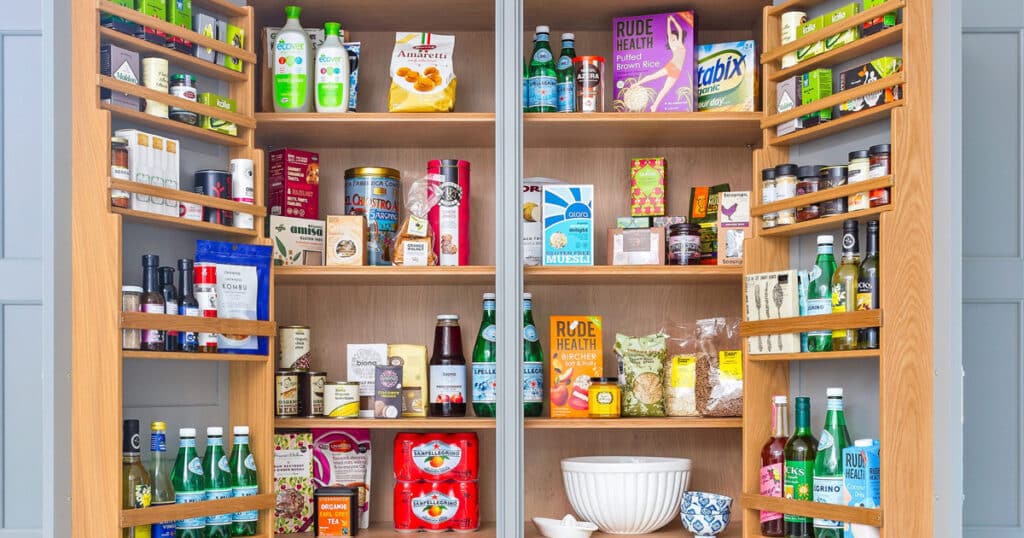
Viral TikTok Posts of Highly-Organized Kitchen Pantries (!) Accused of Being Racist, Sexist
When Liliana King looked over a set of TikTok videos posted by users of the app showing off their kitchen pantries, she was first impressed by how organized the respective panties were and then a bit mystified that people have enough time to post videos of their pantries. “They must not have jobs,” she said.
King, an insurance saleswoman who immigrated to Los Angeles from Peru 24 years ago, found the kitchen pantry videos a little ridiculous.
“This is what other people have time to do? That’s fine, but I don’t have the time to do this. I have a job. I work,” she said.
King didn’t think anything about the pantry posts was offensive and certainly not racist or sexist, as one professor from Loyola University in Chicago alleges.
“I see this as people with a lot of time on their hands and a lot of food in their panties. I wish I had that much food in my pantry,” said King.
Nonetheless, Loyola Associate Professor of Marketing Jenna Drenten noted in a recent article she wrote and posted at theconversation.com an increase in what she calls “pantry porn,” an abundance of social media videos where women show off their fully stocked kitchens and methodically organized home supplies.
“Like its food porn predecessor, pantry porn thrives on stylizing everyday life in exaggerated ways. But where food porn elicits a desire for gluttonous indulgence, pantry porn taps into a different cultural desire: the orderly arrangement of abundance…Excess is bad, but organized excess is good,” Drenten wrote. “The past decade has ushered in a home organizing revolution…An entire cottage industry of blogs, books and television shows have introduced people to terms like ‘decluttering,’ ‘minimalism’ and ‘simple living.’
“Minimalism once represented a countercultural lifestyle rooted in anti-consumption: Use less, buy less, have less,” she continued in the post. “But if pantry porn is any indication, the new minimalism means more is more, as long as the more is not messy. Consumers don’t need less, they need more: more containers, more labels, more storage space.”
Drenten wrote that tidiness has long been associated with status and one’s messiness often leads to assumptions about a person’s capacity to be responsible and respectable.
“Cleanliness has historically been used as a cultural gatekeeping mechanism to reinforce status distinctions,” based on a general perception of “‘niceness,” she wrote. “Nice people, with nice yards, in nice houses, make for nice neighborhoods,” but, “beneath the surface of this anti-messiness, pro-niceness stance is a history of classist, racist and sexist social structures.”
Drenten traces the pantry to the late 1800s, when she says the butler’s pantry acted as an architectural touchstone of the wealthy.
“This small space, tucked between the kitchen and dining room, was a marker of status – an area to hide both the food and the people who prepared it,” she asserted.
“Magazines like Good Housekeeping were once the brokers of idealized domestic work. Now online pantry porn sets the aspirational standard for becoming an ideal mom, ideal wife and ideal woman,” Drenten wrote. “This grew out of a shift toward an intensive mothering ideology that equates being a good mom with time-intensive, labor-intensive, financially expensive care work.
“Sure,” she continued, “all of those baskets and bins serve a functional purpose in the home: seeing what you need, when you need it. But the social pressure to curate a perfect pantry might make some women work overtime. They can’t just shove store-bought boxes of snacks into a cupboard; they must neatly place the grab-and-go snacks into a fully stocked pantry that rivals a boutique corner store.”
Drenten claims the viral TikTok videos show uniformly-labeled and symmetrically-placed supply bins, ingredient containers and shelves created mainly by white women and serve as a “new status symbol” for what it looks like to maintain a “nice” well-kept home. She also believes the pantry porn obsession is also helping to redefine societal standards for what it means to be an ideal mother, wife, woman.
“Perhaps it’s not surprising that pantry porn found its foothold during the COVID-19 pandemic, when shortages in the supply chain surged,” she said. “Keeping stuff on hand became a symbol of resilience for those with the money and space to do so.”
“Pantry porn, as a status symbol, relies on the promise of making daily domestic work easier,” she wrote. “But if women are largely responsible for the work required to maintain the perfectly organized pantry, it’s critical to ask: easier for whom?”
Eighty-five percent of large new homes in America built today include a walk-in pantry, which is listed as the most desirable kitchen feature for new home buyers, according to a 2019 report.



